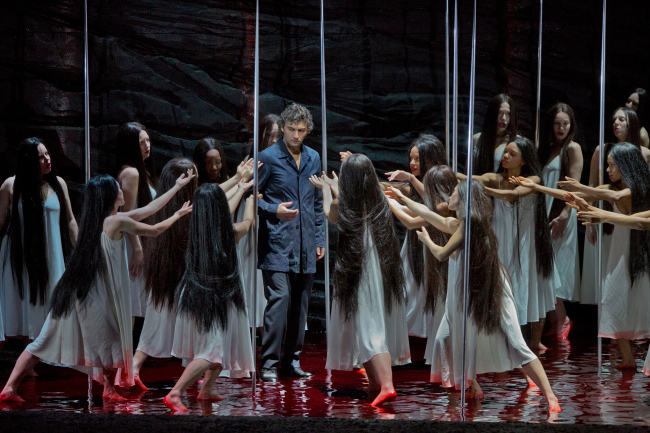Ades’ ‘Powder Her Face’ opens
Thomas Ades wanted to be provocative in his first opera, “Powder Her Face,” when he composed a scene in which he musically depicts a sex act between the Duchess of Argyll and a waiter.
Not enough for director Jay Scheib, who turns the tawdry tale into a numbing night of decadence by adding two dozen naked men standing, stumbling and slumbering around a hotel room in New York City Opera’s new production that opened Friday at the Brooklyn Academy of Music’s Howard Gilman Opera House.
The 1995 work by the then 24-year-old composer started the company’s second straight abbreviated season following its departure from Lincoln Center for the Performing Arts.
With glistening music and a poetic libretto by Philip Hensher portraying the libertine lives of the Duchess and Duke, a socialite proclaimed “wholly immoral” and “a Don Juan among women” by Lord Wheatley in his 1963 divorce ruling, Ades revels in the licentiousness that spilled into the British tabloids.
The pleasure-above-all nature of the Duchess, the former Ethel Margaret Whigham, is fueled by cocaine, alcohol, callousness and disregard for boundaries, while Ades searches for a modern musical idiom that would become more mature in his 2004 composition “The Tempest,” given its Metropolitan Opera premiere last October.
Scampering about in expensive-looking dresses and lingerie, mezzo-soprano Allison Cook had a bit of a Wallis Simpson look and created an uninhibited portrait of the Duchess, her voice soaring, choking and snickering.
Scheib’s production features simple furniture by Marsha Ginsburg on an airy set, with trees interspersed during the latter scenes. There were fashionable costumes by Alba Clemente, and the staging made prominent use of projections by Josh Higgason and video shot on stage by Chelsey Blackmon.
And there were the 22 nude men, billed as a “Corps of Lovers,” at least one of whom did a handstand.
For dauntlessness, it will be hard to top “Powder.”
(AP)
Striking new look for ‘Parsifal’ at Met
In Wagner’s “Parsifal,” the leader of the Knights of the Holy Grail suffers from an agonizing wound that will not heal. In Francois Girard’s vision of the opera, this wound afflicts the earth itself, etching a widening crevice that tears society apart and threatens the survival of mankind.
 |
In this photo provided by the Metropolitan Opera, Jonas Kaufmann rehearses the title character of Wagner’s “Parsifal,” on Feb. 8 in New York. Though traditionalists may object, this is a “Parsifal” to treasure, elevated to the highest musical level by the solemnity and sweep of Daniele Gatti’s conducting and the dedication of a dream cast of singing actors, headed by tenor Jonas Kaufmann in the title role. (AP-Yonhap News) |
The French-Canadian director’s starkly modern and thought-provoking staging, first seen last year in Lyon, France, premiered at the Metropolitan Opera on Friday night. Though traditionalists may object, this is a “Parsifal” to treasure, elevated to the highest musical level by the solemnity and sweep of Daniele Gatti’s conducting and the dedication of a dream cast of singing actors, headed by tenor Jonas Kaufmann in the title role.
From the opening notes of the prelude, Girard attempts to make the audience see themselves in the events on stage. A mirrored curtain reflects back at us a blurred image of the auditorium where we are sitting. Behind the curtain we soon see the chorus, the men stripping off jackets and shoes and remaining dressed in everyday attire of white shirts and dark pants. Once the curtain rises on Michael Levine’s set, the stage is a desolate, perhaps post-apocalyptic landscape with a narrow river running down the center; the men are seated in a circle of chairs on the right, while the women have been banished to the left.
Integral to the production are the video projections by Peter Flaherty, a constantly shifting array of multicolored shapes that sometimes resemble storm clouds, a moonscape or even contours of the female body.
The revelation of the night is baritone Peter Mattei, tackling the role of Amfortas for the first time. When has any singer so powerfully expressed the suffering of this tormented character while producing burnished sounds of such breathtaking beauty? His monologues in the first and final acts are the musical and dramatic highlights of the evening.
(AP)




![[Weekender] Korea's traditional sauce culture gains global recognition](http://res.heraldm.com/phpwas/restmb_idxmake.php?idx=644&simg=/content/image/2024/11/21/20241121050153_0.jpg)



